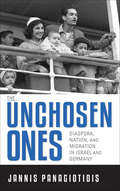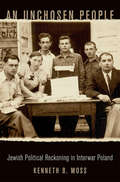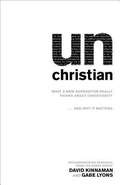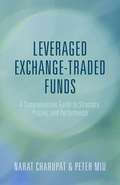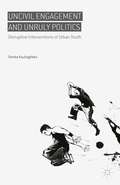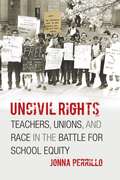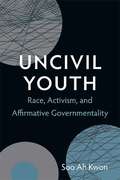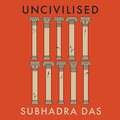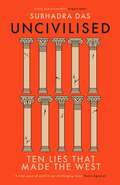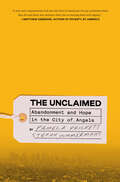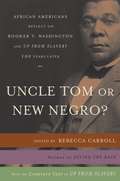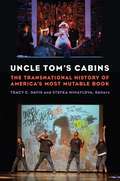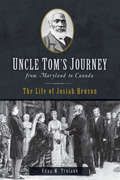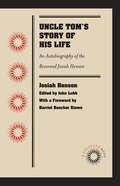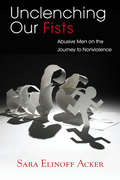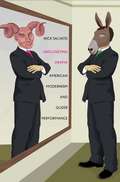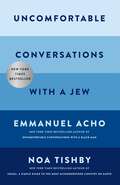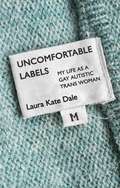- Table View
- List View
The Unchosen Ones: Diaspora, Nation, and Migration in Israel and Germany
by Jannis PanagiotidisThis &“fascinating, original, well-researched, and persuasively argued work&” examines the phenomenon of co-ethnic migration in Israel and Germany (Sebastian Conrad, author of What Is Global History?). Co-ethnic migration happens when migrants seek admission to a country based on their purported ethnicity or nationality being the same as the country of destination. In The Unchosen Ones, social historian Jannis Panagiotidis looks at legislation and implementation regarding co-ethnic migration in Germany and Israel. This study focuses on individual cases ranging from after the Second World War to after the fall of the Berlin Wall where migrants were not allowed to enter the country they sought to make their home. These rejections confound notions of an &“open door&” or a &“return to the homeland&” and present contrasting ideas of descent, culture, blood, and race. Questions of historical origins, immigrant selection and screening, and national belonging are deeply ambiguous, complicating migration even in nations that are purported to be ethnically homogenous. Through highly original and illuminating analysis, Panagiotidis shows that migration is never a simple matter of moving from place to place.
An Unchosen People: Jewish Political Reckoning in Interwar Poland
by Kenneth B. MossA revisionist account of interwar Europe’s largest Jewish community that upends histories of Jewish agency to rediscover reckonings with nationalism’s pathologies, diaspora’s fragility, Zionism’s promises, and the necessity of choice. What did the future hold for interwar Europe’s largest Jewish community, the font of global Jewish hopes? When intrepid analysts asked these questions on the cusp of the 1930s, they discovered a Polish Jewry reckoning with “no tomorrow.” Assailed by antisemitism and witnessing liberalism’s collapse, some Polish Jews looked past progressive hopes or religious certainties to investigate what the nation-state was becoming, what powers minority communities really possessed, and where a future might be found—and for whom. The story of modern Jewry is often told as one of creativity and contestation. Kenneth B. Moss traces instead a late Jewish reckoning with diasporic vulnerability, nationalism’s terrible potencies, Zionism’s promises, and the necessity of choice. Moss examines the works of Polish Jewry’s most searching thinkers as they confronted political irrationality, state crisis, and the limits of resistance. He reconstructs the desperate creativity of activists seeking to counter despair where they could not redress its causes. And he recovers a lost grassroots history of critical thought and political searching among ordinary Jews, young and powerless, as they struggled to find a viable future for themselves—in Palestine if not in Poland, individually if not communally. Focusing not on ideals but on a search for realism, Moss recasts the history of modern Jewish political thought. Where much scholarship seeks Jewish agency over a collective future, An Unchosen People recovers a darker tradition characterized by painful tradeoffs amid a harrowing political reality, making Polish Jewry a paradigmatic example of the minority experience endemic to the nation-state.
Unchristian: What a New Generation Really Thinks about Christianity... and Why it Matters
by David Kinnaman Gabe LyonsChristianity has an image problem. Christians are supposed to represent Christ to the world. But according to the latest report card, something has gone terribly wrong. Using descriptions like -hypocritical, - -insensitive, - and -judgmental, - young Americans share an impression of Christians that's nothing short of . . . unChristian. Groundbreaking research into the perceptions of people aged 16-29 reveals that Christians have taken several giant steps backward in one of their most important assignments. The surprising details of the study, commissioned by the Fermi Project and conducted by The Barna Group, are presented with uncompromising honesty in unChristian. Find out why these negative perceptions exist, learn how to reverse them in a Christlike manner, and discover practical examples of how Christians can positively contribute to culture.
Uncivil Engagement and Unruly Politics: Disruptive Interventions of Urban Youth
by Femke KaulingfreksThis book explores the significance of riots and public disturbances caused by marginalized youth with a migrant background in France and the Netherlands, and how their demands for recognition, justice and equal opportunities are voiced in uncivil, yet politically meaningful ways.
Uncivil Engagement and Unruly Politics: Disruptive Interventions of Urban Youth
by Femke KaulingfreksThis book explores the significance of riots and public disturbances caused by marginalized youth with a migrant background in France and the Netherlands, and how their demands for recognition, justice and equal opportunities are voiced in uncivil, yet politically meaningful ways.
Uncivil Mirth: Ridicule in Enlightenment Britain
by Ross CarrollHow the philosophers and polemicists of eighteenth-century Britain used ridicule in the service of religious toleration, abolition, and political justiceThe relaxing of censorship in Britain at the turn of the eighteenth century led to an explosion of satires, caricatures, and comic hoaxes. This new vogue for ridicule unleashed moral panic and prompted warnings that it would corrupt public debate. But ridicule also had vocal defenders who saw it as a means to expose hypocrisy, unsettle the arrogant, and deflate the powerful. Uncivil Mirth examines how leading thinkers of the period searched for a humane form of ridicule, one that served the causes of religious toleration, the abolition of the slave trade, and the dismantling of patriarchal power.Ross Carroll brings to life a tumultuous age in which the place of ridicule in public life was subjected to unparalleled scrutiny. He shows how the Third Earl of Shaftesbury, far from accepting ridicule as an unfortunate byproduct of free public debate, refashioned it into a check on pretension and authority. Drawing on philosophical treatises, political pamphlets, and conduct manuals of the time, Carroll examines how David Hume, Mary Wollstonecraft, and others who came after Shaftesbury debated the value of ridicule in the fight against intolerance, fanaticism, and hubris.Casting Enlightenment Britain in an entirely new light, Uncivil Mirth demonstrates how the Age of Reason was also an Age of Ridicule, and speaks to our current anxieties about the lack of civility in public debate.
Uncivil Rights: Teachers, Unions, and Race in the Battle for School Equity
by Jonna PerrilloAlmost fifty years after Brown v. Board of Education, a wealth of research shows that minority students continue to receive an unequal education. At the heart of this inequality is a complex and often conflicted relationship between teachers and civil rights activists, examined fully for the first time in Jonna Perrillo's Uncivil Rights, which traces the tensions between the two groups in New York City from the Great Depression to the present. While movements for teachers' rights and civil rights were not always in conflict, Perrillo uncovers the ways they have become so, brought about both by teachers who have come to see civil rights efforts as detracting from or competing with their own goals and by civil rights activists whose aims have de-professionalized the role of the educator. Focusing in particular on unionized teachers, Perrillo finds a new vantage point from which to examine the relationship between school and community, showing how in this struggle, educators, activists, and especially our students have lost out.
Uncivil Rights: Teachers, Unions, and Race in the Battle for School Equity
by Jonna PerrilloAlmost fifty years after Brown v. Board of Education, a wealth of research shows that minority students continue to receive an unequal education. At the heart of this inequality is a complex and often conflicted relationship between teachers and civil rights activists, examined fully for the first time in Jonna Perrillo’s Uncivil Rights, which traces the tensions between the two groups in New York City from the Great Depression to the present.While movements for teachers’ rights and civil rights were not always in conflict, Perrillo uncovers the ways they have become so, brought about both by teachers who have come to see civil rights efforts as detracting from or competing with their own goals and by civil rights activists whose aims have de-professionalized the role of the educator. Focusing in particular on unionized teachers, Perrillo finds a new vantage point from which to examine the relationship between school and community, showing how in this struggle, educators, activists, and especially our students have lost out.
Uncivil Youth: Race, Activism, and Affirmative Governmentality
by Kwon Soo AhIn Uncivil Youth, Soo Ah Kwon explores youth of color activism as linked to the making of democratic citizen-subjects. Focusing attention on the relations of power that inform the social and political practices of youth of color, Kwon examines how after-school and community-based programs are often mobilized to prevent potentially "at-risk" youth from turning to "juvenile delinquency" and crime. These sorts of strategic interventions seek to mold young people to become self-empowered and responsible citizens. Theorizing this mode of youth governance as "affirmative governmentality," Kwon investigates the political conditions that both enable youth of color to achieve meaningful change and limit their ability to do so given the entrenchment of nonprofits in the logic of a neoliberal state. She draws on several years of ethnographic research with an Oakland-based, panethnic youth organization that promotes grassroots activism among its second-generation Asian and Pacific Islander members (ages fourteen to eighteen). While analyzing the contradictions of the youth organizing movement, Kwon documents the genuine contributions to social change made by the young people with whom she worked in an era of increased youth criminalization and anti-immigrant legislation.
Uncivilised: Ten Lies that Made the West
by Subhadra DasSome things are a given. The value of a good education. Time's progress. Death.Except most of the ideas that form Western Civilisation are just that - ideas. Taking cues from Greek philosophy and honed in the Enlightenment, certain notions about humanity and human society grew into the tenets we live by, and we haven't questioned them a great deal since. But isn't it time we asked who really benefits from the values at the core of our society? How much truth lies in a science that conjured up 'race'? Who do laws and nations really protect? Why does it feel like time is money? What even is 'art'?And the real question - is the West really as 'civilised' as it thinks it is?This audiobook will put everything back on the table and ask listeners to reconsider what they thought they knew about civilisation. Taking 10 core values of Western Civilisation in turn, it will examine the root of the idea, how it developed, and how it's impacted the way we live. Most importantly it will reveal how each of these ideas was either created in opposition to another group of people, or based on ideas they had first (and better). (Un)civilised will ask listeners to open their eyes to the why behind how they think the world works.(P) 2024 Hodder & Stoughton Limited
Uncivilised: Ten Lies that Made the West
by Subhadra DasPre-order the enthralling and radical book that overturns our assumptions about civilisation and society'A witty and accessible survey of the shortcomings of western civilisation as many people imagine it' ANGELA SAINI, author of Superior'A vital piece of work in our challenging times that reminds us of the rich history and influences outside the West. Das writes with passion and humour to open our eyes to the history that has shaped our world' ROMA AGRAWAL, author of Built and Nuts and Bolts___________Some things are a given: knowledge is power, time is money, justice is blind. But many of the big ideas that underpin Western civilisation are just that - ideas. Taking cues from Greek philosophy and honed in the Enlightenment, certain notions about humanity and society grew into the tenets we still live by today, and we haven't questioned them a great deal since.But what if they're not just ideas? What if they're outright lies? Isn't it time we asked who really benefits from the values at the core of our society? What is unbiased about a science that conjured up 'race'? Who do laws and nations actually protect? What even is 'art'? And the real question: is the West really as 'civilised' as it thinks it is?Uncivilised puts everything back on the table and asks readers to reconsider what they thought they knew about civilisation, starting with the ten lies that have shaped their lives.
The Unclaimed: Abandonment and Hope in the City of Angels
by Pamela Prickett Stefan Timmermans&“A rare and compassionate look into the lives of Americans who go unclaimed when they die and those who dedicate their lives to burying them with dignity.&”—Matthew Desmond, #1 New York Times bestselling author of Poverty, by America&“Cleareyed and disturbing, yet pulsing with empathy . . . [this] book is a work of grace.&”—The New York TimesFor centuries, people who died destitute or alone were buried in potters&’ fields—a Dickensian end that even the most hard-pressed families tried to avoid. Today, more and more relatives are abandoning their dead, leaving it to local governments to dispose of the bodies. Up to 150,000 Americans now go unclaimed each year. Who are they? Why are they being forgotten? And what is the meaning of life if your death doesn&’t matter to others?In this extraordinary work of narrative nonfiction, eight years in the making, sociologists Pamela Prickett and Stefan Timmermans uncover a hidden social world. They follow four individuals in Los Angeles, tracing the twisting, poignant paths that put each at risk of going unclaimed, and introducing us to the scene investigators, notification officers, and crematorium workers who care for them when no one else will.The Unclaimed lays bare the difficult truth that anyone can be abandoned. It forces us to confront a variety of social ills, from the fracturing of families and the loneliness of cities to the toll of rising inequality. But it is also filled with unexpected moments of tenderness. In Boyle Heights, a Mexican American neighborhood not far from the glitter of Hollywood, hundreds of strangers come together each year to mourn the deaths of people they never knew. These ceremonies, springing up across the country, reaffirm our shared humanity and help mend our frayed social fabric.Beautifully crafted and profoundly empathetic, The Unclaimed urges us to expand our circle of caring—in death and in life.
Uncle Swami
by Vijay PrashadWithin hours of the attacks on the World Trade Center, misdirected assaults on Sikhs and other South Asians flared on streets across the nation, serving as harbingers of a more suspicious, less discerning, and increasingly fearful world view that would drastically change ideas of belonging and acceptance in America.Weaving together distinct strands of recent South Asian immigration to the United States, Uncle Swami creates a richly textured analysis of the systems and sentiments behind shifting notions of cultural identity in a post 9/11 world. Vijay Prashad continues the conversation sparked by his celebrated work The Karma of Brown Folk and confronts the experience of migration across an expanse of generations and class divisions, from the birth of political activism among second generation immigrants to the meteoric rise of South Asian American politicians in Republican circles to the migrant workers who suffer in the name of American capitalism.A powerful new indictment of American imperialism at the dawn of the twenty-first century, Uncle Swami restores a diasporic community to its full-fledged complexity, beyond model minorities and the specters of terrorism.
Uncle Tom or New Negro?: African Americans Reflect on Booker T. Washington and UP FROM SLAVERY 100 Years Later
by Rebecca CarrollOn the ninetieth anniversary of Booker T. Washington's death comes a passionate, provocative dialogue on his complicated legacy, including the complete text of his classic autobiography, Up from Slavery.Booker T. Washington was born a slave in 1858, yet roughly forty years later he had established the Tuskegee Institute. Befriended by a U.S. president and corporate titans, beloved and reviled by the black community, Washington was one of the most influential voices on the postslavery scene. But Washington's message of gradual accommodation was accepted by some and rejected by others, and, almost a century after his death, he is still one of the most controversial and misunderstood characters in American history. Uncle Tom or New Negro? does much more than provide yet another critical edition of Washington's memoirs. Instead, Carroll has interviewed an outstanding array of African American luminaries including Julianne Malveaux, cultural critics Debra Dickerson and John McWhorter, and Pulitzer Prize-winning journalist and radio talk-show host Karen Hunter, among others. In a dazzling collection bursting with invigorating and varying perspectives, (e.g. What would Booker T. think of Sean Combs or Russell Simmons? Was Washington a "tragic buffoon" or "a giver of hope to those on the margins of the margins"?) this cutting-edge book allows you to reach your own conclusions about a controversial and perhaps ultimately enigmatic figure.From the Trade Paperback edition.
Uncle Tom's Cabin or, Life Among the Lowly
by Harriet Beecher Stowe Ann DouglasThe book that some say helped start a war-now available in a new package! The story of a slave struggling to maintain his dignity during the pre-Civil War era, 'Uncle Tom's Cabin' was published in 1852 to tremendous success. Since then, the book has received significant acclaim and invoked controversy. Many believe it was an important step on the road to the Civil War, but others feel it encouraged stereotypes still fought against today. Yet all can agree that Harriett Beecher Stowe's novel was been incredibly influential.   Following the slave Tom as he is bought and sold to one owner after another, as well as other slaves who escape to freedom with much difficulty, 'Uncle Tom's Cabin' is a crucial part of our American history. Now available in this Canterbury Classics edition with a special heat-burnished cover, foil stamping, and designed endpapers, it is also a classic well worth reading today.   About the Word Cloud Classics series: Classic works of literature with a clean, modern aesthetic! Perfect for both old and new literature fans, the Word Cloud Classics series from Canterbury Classics provides a chic and inexpensive introduction to timeless tales. With a higher production value, including heat burnished covers and foil stamping, these eye-catching, easy-to-hold editions are the perfect gift for students and fans of literature everywhere.  
Uncle Tom's Cabins: The Transnational History of America's Most Mutable Book
by Tracy C Davis Stefka MihaylovaAs Harriet Beecher Stowe’s novel Uncle Tom’s Cabin traveled around the world, it was molded by the imaginations and needs of international audiences. For over 150 years it has been coopted for a dazzling array of causes far from what its author envisioned. This book tells thirteen variants of Uncle Tom’s journey, explicating the novel’s significance for Canadian abolitionists and the Liberian political elite that constituted the runaway characters’ landing points; nineteenth-century French theatergoers; liberal Cuban, Romanian, and Spanish intellectuals and social reformers; Dutch colonizers and Filipino nationalists in Southeast Asia; Eastern European Cold War communists; Muslim readers and spectators in the Middle East; Brazilian television audiences; and twentieth-century German holidaymakers. Throughout these encounters, Stowe’s story of American slavery serves as a paradigm for understanding oppression, selectively and strategically refracting the African American slave onto other iconic victims and freedom fighters. The book brings together performance historians, literary critics, and media theorists to demonstrate how the myriad cultural and political effects of Stowe’s enduring story has transformed it into a global metanarrative with national, regional, and local specificity.
Uncle Tom's Journey from Maryland to Canada: The Life of Josiah Henson (American Heritage)
by Edna M. Troiano“The true story behind Uncle Tom’s Cabin . . . the real story of his escape is more moving, and more harrowing, than anything one could put in fiction.” —Yesterday’s AmericaJosiah Henson was born into slavery in La Plata, Maryland, and auctioned off as a child to pay his owner’s debt. After numerous trials and abuse, he earned the trust of his slaveholder by exhibiting intelligence and skill.Daringly, he escaped to Canada with his wife and children. There he established a settlement and school for fugitives and repeatedly returned to the United States to help lead others to freedom along the Underground Railroad. He published a bestselling autobiography and became a popular preacher, lecturer, and international celebrity. He is immortalized as the inspiration for the title character in Harriet Beecher Stowe’s Uncle Tom’s Cabin. Author Edna M. Troiano recounts the amazing life of Maryland’s Josiah Henson and explores the sites devoted to his memory.“[An] intriguing examination of another heroic individual, Josiah Henson. Born in 1789, in Maryland, Henson was the abolitionist Harriet Beecher Stowe’s primary inspiration for Uncle Tom’s Cabin.” —Literary Review of Canada
Uncle Tom's Story of His Life
by Josiah HensonThis 1876 version of Josiah Henson's autobiography, the first of many editions issued by British editor John Lobb, followed the original 1849 edition and a much-expanded 1858 version. The autobiography traces Henson's life from his birth into slavery in Maryland in 1789; his escape to Canada in 1830; his participation in the founding of the Dawn Settlement for fugitive slaves in Ontario; and his several trips to England to raise funds for the settlement. Henson, who in his later years toured as the model for the Uncle Tom of Harriet Beecher Stowe's novel, describes his meeting with Stowe in 1852 and draws parallels between the histories of other Uncle Tom's Cabin characters and his own acquaintances. While Stowe herself stressed that there was no single model for her title character, she called Henson a "parallel instance" for Uncle Tom in A Key to Uncle Tom's Cabin. Reprinted multiple times in the United States and Britain in the nineteenth century and translated into several other languages, Henson's autobiography continues to reward readers with its descriptions not only of slave life in Maryland and Kentucky, but also of the business and educational ventures of escaped slaves in Ontario.
Unclenching Our Fists: Abusive Men on the Journey to Nonviolence
by Sara Elinoff AckerThis book features eleven first-person stories of men from diverse class and racial backgrounds who have made a long-term commitment to end their physical and emotional abuse and controlling behaviors. These men speak frankly about the abuse they inflicted on their families, what it took to get them to face themselves, and how they feel about the damage they have caused. All participated in violence intervention programs, some for as long as ten years. To put a face on violence and to encourage activism for reform, most of the eleven have allowed their photos and real names to be used in the book. Surrounding this material are chapters that provide context about the disputes among researchers about whether batterer intervention programs work (only a small number of batterers renounce their abuse) and chapters that address the reactions of partners to these stories. "When the Man You Love is Abusive" is designed to caution women not to be manipulated by accounts of change and to outline the stages men need to pass through in the long process of becoming accountable. "The Last Word: Voices of Survivors" ends the book with a focus group discussion in which former abuse victims and advocates respond candidly to the men's stories.
Unclenching Our Fists: Abusive Men on the Journey to Nonviolence
by Sara Elinoff AckerThis book features eleven first-person stories of men from diverse class and racial backgrounds who have made a long-term commitment to end their physical and emotional abuse and controlling behaviors. These men speak frankly about the abuse they inflicted on their families, what it took to get them to face themselves, and how they feel about the damage they have caused. All participated in violence intervention programs, some for as long as ten years. To put a face on violence and to encourage activism for reform, most of the eleven have allowed their photos and real names to be used in the book. Surrounding this material are chapters that provide context about the disputes among researchers about whether batterer intervention programs work (only a small number of batterers renounce their abuse) and chapters that address the reactions of partners to these stories. "When the Man You Love is Abusive" is designed to caution women not to be manipulated by accounts of change and to outline the stages men need to pass through in the long process of becoming accountable. "The Last Word: Voices of Survivors" ends the book with a focus group discussion in which former abuse victims and advocates respond candidly to the men's stories.
Uncloseting Drama: American Modernism and Queer Performance
by Nick SalvatoIn this elegant book, modernism is illuminated through little-known but striking works by Ezra Pound, Gertrude Stein, and others who revived the "closet drama"--plays written largely for private reading--as a means of exploring forbidden sexualities.
Uncomfortable Conversations with a Black Man
by Emmanuel AchoAn urgent primer on race and racism, from the host of the viral hit video series“Uncomfortable Conversations with a Black Man”“You cannot fix a problem you do not know you have.” So begins Emmanuel Acho in his essential guide to the truths Americans need to know to address the systemic racism that has recently electrified protests in all fifty states. “There is a fix,” Acho says. “But in order to access it, we’re going to have to have some uncomfortable conversations.”In Uncomfortable Conversations With a Black Man, Acho takes on all the questions, large and small, insensitive and taboo, many white Americans are afraid to ask—yet which all Americans need the answers to, now more than ever. With the same open-hearted generosity that has made his video series a phenomenon, Acho explains the vital core of such fraught concepts as white privilege, cultural appropriation, and “reverse racism.” In his own words, he provides a space of compassion and understanding in a discussion that can lack both. He asks only for the reader’s curiosity—but along the way, he will galvanize all of us to join the antiracist fight.
Uncomfortable Conversations with a Jew
by Emmanuel Acho Noa TishbyFrom two New York Times bestselling authors, a timely, disarmingly honest, and thought-provoking investigation into antisemitism that connects the dots between the tropes and hatred of the past to our current complicated moment. <P><P> For Emmanuel Acho and Noa Tishby no question about Jews is off-limits. They go there. They cover Jews and money. Jews and power. Jews and privilege. Jews and white privilege. The Black and Jewish struggle. Emmanuel asks, Did Jews kill Jesus? To which Noa responds, “Why are Jewish people history’s favorite scapegoat?” They unpack Judaism itself: Is it a religion, culture, a peoplehood, or a race? And: Are you antisemitic if you’re anti-Zionist? <P><P> The questions—and answers—might make you squirm, but together, they explain the tropes, stereotypes, and catalysts of antisemitism in America today. <P><P> The topics are complicated and Acho and Tishby bring vastly different perspectives. Tishby is an outspoken Israeli American. Acho is a mild-mannered son of a Nigerian American pastor. But they share a superpower: an uncanny ability to make complicated ideas easy to understand so anyone can follow the straight line from the past to our immediate moment—and then see around corners. Acho and Tishby are united by the core belief that hatred toward one group is never isolated: if you see the smoke of bigotry in one place, expect that we will all be in the fire. <P><P> Informative and accessible, Uncomfortable Conversations with a Jew has a unique structure: Acho asks questions and Tishby answers them with deeply personal, historical, and political responses. This book will enable anyone to explain—and identify—what Jewish hatred looks like. It is a much-needed lexicon for this fraught moment in Jewish history. As Acho says, “Proximity breeds care and distance breeds fear.” <p> <b>New York Times Bestseller</b>
Uncomfortable Labels: My Life as a Gay Autistic Trans Woman
by Laura Kate Dale"So while the assumption when I was born was that I was or would grow up to be a neurotypical heterosexual boy, that whole idea didn't really pan out long term."In this candid, first-of-its-kind memoir, Laura Kate Dale recounts what life is like growing up as a gay trans woman on the autism spectrum. From struggling with sensory processing, managing socially demanding situations and learning social cues and feminine presentation, through to coming out as trans during an autistic meltdown, Laura draws on her personal experiences from life prior to transition and diagnosis, and moving on to the years of self-discovery, to give a unique insight into the nuances of sexuality, gender and autism, and how they intersect.Charting the ups and downs of being autistic and on the LGBT spectrum with searing honesty and humour, this is an empowering, life-affirming read for anyone who's felt they don't fit in.
